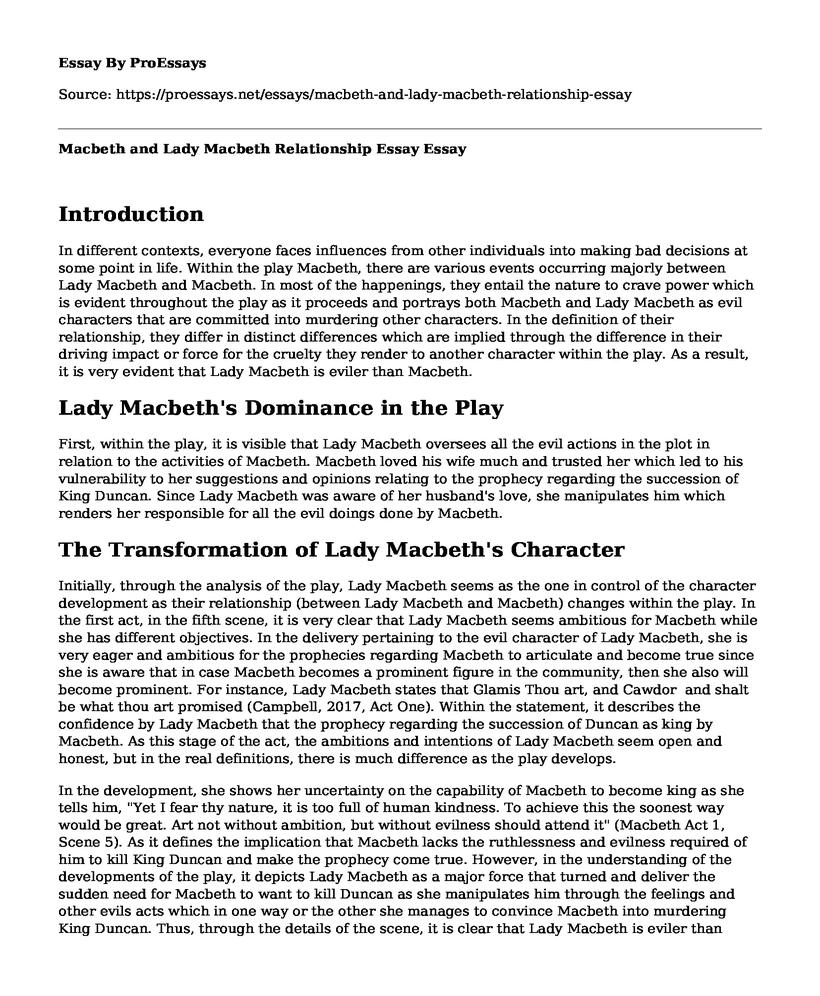Introduction
In different contexts, everyone faces influences from other individuals into making bad decisions at some point in life. Within the play Macbeth, there are various events occurring majorly between Lady Macbeth and Macbeth. In most of the happenings, they entail the nature to crave power which is evident throughout the play as it proceeds and portrays both Macbeth and Lady Macbeth as evil characters that are committed into murdering other characters. In the definition of their relationship, they differ in distinct differences which are implied through the difference in their driving impact or force for the cruelty they render to another character within the play. As a result, it is very evident that Lady Macbeth is eviler than Macbeth.
Lady Macbeth's Dominance in the Play
First, within the play, it is visible that Lady Macbeth oversees all the evil actions in the plot in relation to the activities of Macbeth. Macbeth loved his wife much and trusted her which led to his vulnerability to her suggestions and opinions relating to the prophecy regarding the succession of King Duncan. Since Lady Macbeth was aware of her husband's love, she manipulates him which renders her responsible for all the evil doings done by Macbeth.
The Transformation of Lady Macbeth's Character
Initially, through the analysis of the play, Lady Macbeth seems as the one in control of the character development as their relationship (between Lady Macbeth and Macbeth) changes within the play. In the first act, in the fifth scene, it is very clear that Lady Macbeth seems ambitious for Macbeth while she has different objectives. In the delivery pertaining to the evil character of Lady Macbeth, she is very eager and ambitious for the prophecies regarding Macbeth to articulate and become true since she is aware that in case Macbeth becomes a prominent figure in the community, then she also will become prominent. For instance, Lady Macbeth states that Glamis Thou art, and Cawdor and shalt be what thou art promised (Campbell, 2017, Act One). Within the statement, it describes the confidence by Lady Macbeth that the prophecy regarding the succession of Duncan as king by Macbeth. As this stage of the act, the ambitions and intentions of Lady Macbeth seem open and honest, but in the real definitions, there is much difference as the play develops.
In the development, she shows her uncertainty on the capability of Macbeth to become king as she tells him, "Yet I fear thy nature, it is too full of human kindness. To achieve this the soonest way would be great. Art not without ambition, but without evilness should attend it" (Macbeth Act 1, Scene 5). As it defines the implication that Macbeth lacks the ruthlessness and evilness required of him to kill King Duncan and make the prophecy come true. However, in the understanding of the developments of the play, it depicts Lady Macbeth as a major force that turned and deliver the sudden need for Macbeth to want to kill Duncan as she manipulates him through the feelings and other evils acts which in one way or the other she manages to convince Macbeth into murdering King Duncan. Thus, through the details of the scene, it is clear that Lady Macbeth is eviler than Macbeth and her guilt leads her into committing suicide.
Counter-Argument: Macbeth's Role and Ambitions
As a counter-argument, there are many actions by Lady Macbeth that imply her need to ensure that her husband becomes king. With the predicament, she is willing to do everything it takes to make sure that Macbeth becomes a prominent person in the society and their king. She might have rendered major manipulations to her husband; however, they are both selfish and greedy through their desires for the throne (Godinez). Also, it is evident that at some point Macbeth considers himself greater than others through pride.
Works Cited
Campbell, Stancil. "Macbeth" by William Shakespeare. 2004." (2017).
Godinez, Henry Dominic. "Macbeth, Shakespeare." Macbeth, Shakespeare. 1800.
Cite this page
Macbeth and Lady Macbeth Relationship Essay. (2022, Jan 04). Retrieved from https://proessays.net/essays/macbeth-and-lady-macbeth-relationship-essay
If you are the original author of this essay and no longer wish to have it published on the ProEssays website, please click below to request its removal:
- Did Shakespeare Write All of the Plays Attributed to Him?
- Cross a Bridge when You Come to It
- Tom Jones Novel Essay
- Death of Salesmanship and Miller's Death of a Salesman Essay Example
- Essay Sample on Holst's Planets: A Celestial Journey of Mythology and Music
- Developing an Effective Thesis: Crafting a Winning Statement - Essay Sample
- Essay on Self-Gain: The Best Approach for a Virtuous Person in 'The Life You Save May Be Your Own'







